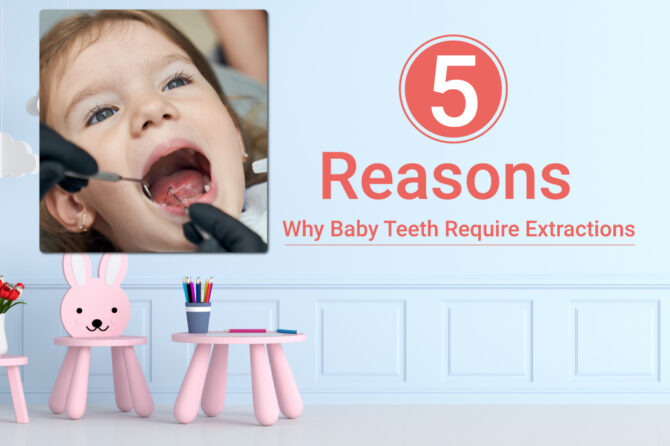
5 Reasons Why Baby Teeth Require Extractions
Extraction of baby teeth refers to removing primary (or “baby”) teeth that have become loose, damaged, or decayed and need to be removed to make room for permanent teeth. This procedure is performed by a pediatric dentist, who uses special tools to remove the tooth gently. The extraction process is usually done under local anesthesia to minimize discomfort, and the dentist will provide appropriate aftercare instructions to help ensure proper healing. If a baby’s tooth is extracted too early, it may affect the proper development and spacing of the permanent teeth. Therefore, extraction is typically a last resort, and other options, such as filling or crowning, will be considered first.
The baby teeth extraction procedure
Pediatric tooth extraction is a common dental procedure that involves numbing the area around the tooth, using dental tools to loosen the tooth from the gum, and then gently removing the tooth. Sometimes, the dentist may need to make a small incision in the gum to access the tooth. After the extraction, the dentist will usually provide instructions for caring for the extraction site to ensure proper healing. It’s important to follow these instructions and contact your dentist if you experience any pain or complications.
Five most common reasons Why Baby Teeth Require Extractions
A dentist or pediatric dentist can determine if a baby’s tooth requires extraction. The following are some reasons why a baby tooth may need to be extracted:
- Tooth decay: If a baby tooth has extensive decay that cannot be repaired with a filling or crown treatment, the tooth may need to be extracted to prevent infection and further damage to surrounding teeth
- Crowding: If a baby tooth is not lost naturally and prevents permanent teeth from erupting properly, extraction may be necessary to create space for the adult teeth
- Infection: If a baby’s tooth becomes infected, extraction may be necessary to prevent the infection from spreading to other teeth or parts of the body
- Trauma: Extraction may be necessary to prevent pain and further damage if a baby’s tooth is severely damaged or knocked out
- Impaction: If a baby tooth is impacted, meaning it cannot emerge fully or properly, extraction may be necessary to prevent pain and complications
How to take care of a baby after teeth extractions?
Here are some general tips to take care of a baby after teeth extractions:
- Offer soft foods: Provide soft and easy-to-eat foods such as mashed potatoes, yogurt, and applesauce. Avoid giving hard and crunchy foods or foods that require a lot of chewing
- Keep the mouth clean: Gently wipe the gums and teeth with a clean, damp cloth or gauze pad after each feeding. Avoid using a toothbrush or mouthwash for the first few days
- Provide pain relief: Use over-the-counter pain medications such as acetaminophen or ibuprofen to help manage discomfort
- Apply ice: Place a cold, damp cloth or a small ice pack on the outside of the cheek to help reduce swelling and discomfort
- Follow instructions: Follow the post-operative instructions provided by the dentist or oral surgeon. It may include avoiding certain activities and medications or using prescribed medications
- Monitor for complications: Watch for any signs of bleeding, fever, or infection, and contact the dentist or oral surgeon immediately if any concerns arise
- It’s vital to provide close attention and care to a baby after a tooth extraction to ensure proper healing and avoid complications
Treatment provided by doctors for baby teeth extractions
The treatment provided by doctors for baby teeth extractions typically involves the following steps:
- Evaluation: The dentist or oral surgeon will examine the baby’s teeth and mouth to determine the need for extraction and develop a treatment plan
- Anesthesia: The baby will be given local anesthesia to numb the area around the tooth, or in some cases, the doctor may use general anesthesia to keep the baby asleep during the procedure
- Extraction: The dentist or oral surgeon will use specialized dental tools to loosen and remove the tooth gently
- Aftercare: The doctor will provide instructions for caring for the extraction site and may prescribe pain medication to help manage any discomfort
- Follow-up: The baby may need to return for a follow-up appointment to ensure proper healing and monitor for complications
The extractions treatment doctors may vary depending on the specific circumstances of the baby’s case. It’s essential to follow the doctor’s instructions closely to ensure proper healing and prevent complications.
Conclusion
Kids Dental Studio offers a range of services to meet the unique needs of young patients, including routine dental exams, cleanings, fluoride treatments, sealants, and fillings. They also provide specialized services such as orthodontics and oral surgery, as well as education and guidance on maintaining good oral hygiene habits.
A key aspect of this pediatric dental clinic is creating a welcoming and comfortable environment for children. It includes child-friendly décor, games, and activities in the waiting area and staff trained to work with children and help them feel at ease during their appointments.
Leave a reply